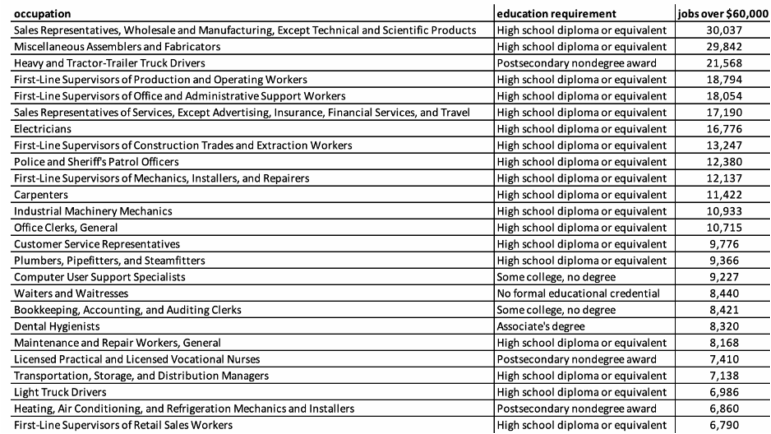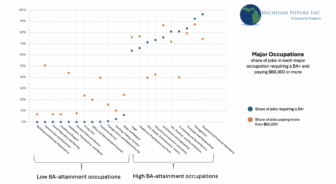A central takeaway of our analysis of the Michigan labor market is that two-thirds of all Michigan jobs that pay more than $60,000 are in high BA-attainment occupations. Simply put, if you have a BA, the odds of obtaining a job that pays more than $60,000 are very high. If you don’t have a BA, the odds of obtaining a job that pays more than $60,000 are quite low.
However, another central takeaway of our analysis is that the jobs in low BA-attainment occupations that pay more than $60,000 are often different from what one might think. Media narratives suggest that all the good paying jobs that don’t require a BA are in blue collar occupations. And that the route to those high-paying occupations is through some sort of training program. Upon closer inspection, the reality is far more complex.
Below is a list of the twenty-five occupations in Michigan with the largest number of jobs that pay more than $60,000 and don’t require a bachelor’s degree.

The first thing to notice is that while about half of the jobs are in blue-collar occupations, the other half are in a range of other jobs that we rarely hear about: sales, office clerks, customer service representatives, dental hygienists, etc. These are occupations that are often underemphasized in both the story of our economy, and the kinds of training programs on offer.
The second thing to notice is that supervisory positions play an outsized role in this list. Six of the twenty-five jobs on this list are either supervisors or managers. And five of the thirteen blue-collar jobs on this list are either supervisors or managers. This is important to understand because it completely alters our conception of the dominant pathway to high-paying jobs for those without a BA. Much of the workforce development conversation is focused on training: what training programs can we offer that can move individuals into a high wage job? But these supervisory and managerial positions aren’t gained through training, but rather through on-the-job experience and promotion. Indeed, this is why for many jobs on the list, no education beyond high school is required, though time on the job is required.
This ought to have significant implications for how we think about workforce development policy and social safety-net policy. On the workforce side, it means we should be structuring more programs that teach the skills needed to obtain supervisory and managerial roles – a set of “softer,” more general skills, as opposed to hard, technical skills. And we also need to be creating social safety-net policies that recognize that most Michigan jobs are not high-paying, and that enable Michigan workers to make ends meet in their current job before, perhaps, they are promoted to a better-paying managerial or supervisory position.
A final thing to note about this list is that if you dig a bit deeper, you can see the importance of higher education even in this list of good-paying jobs that don’t require a BA. The “doesn’t require a BA” designation is created by BLS researchers, both based on the education folks in a particular job typically have, and an assessment of the kinds of tasks someone has to perform in a particular job. But BLS also publishes data on the actual educational attainment of all the workers in a particular job. And what you see in this data is that in ten of these twenty-five occupations, more than a quarter of workers have a BA or more (sales reps in wholesale or manufacturing; first-line supervisors of office and admin workers; sales reps of services; police and sheriff’s patrol officers; customer service representatives; computer user support specialists; dental hygienists; transportation, storage, and distribution managers; first-line supervisors of retail sales workers). This could suggest that though a BA is not required for these occupations, the broader set of “soft” skills gained through higher education may be advantageous in obtaining one of these jobs even if a BA is not required for the position. It’s also possible that the BA holders in these occupations are commanding higher wages, and driving up wages for the occupation as a whole.







